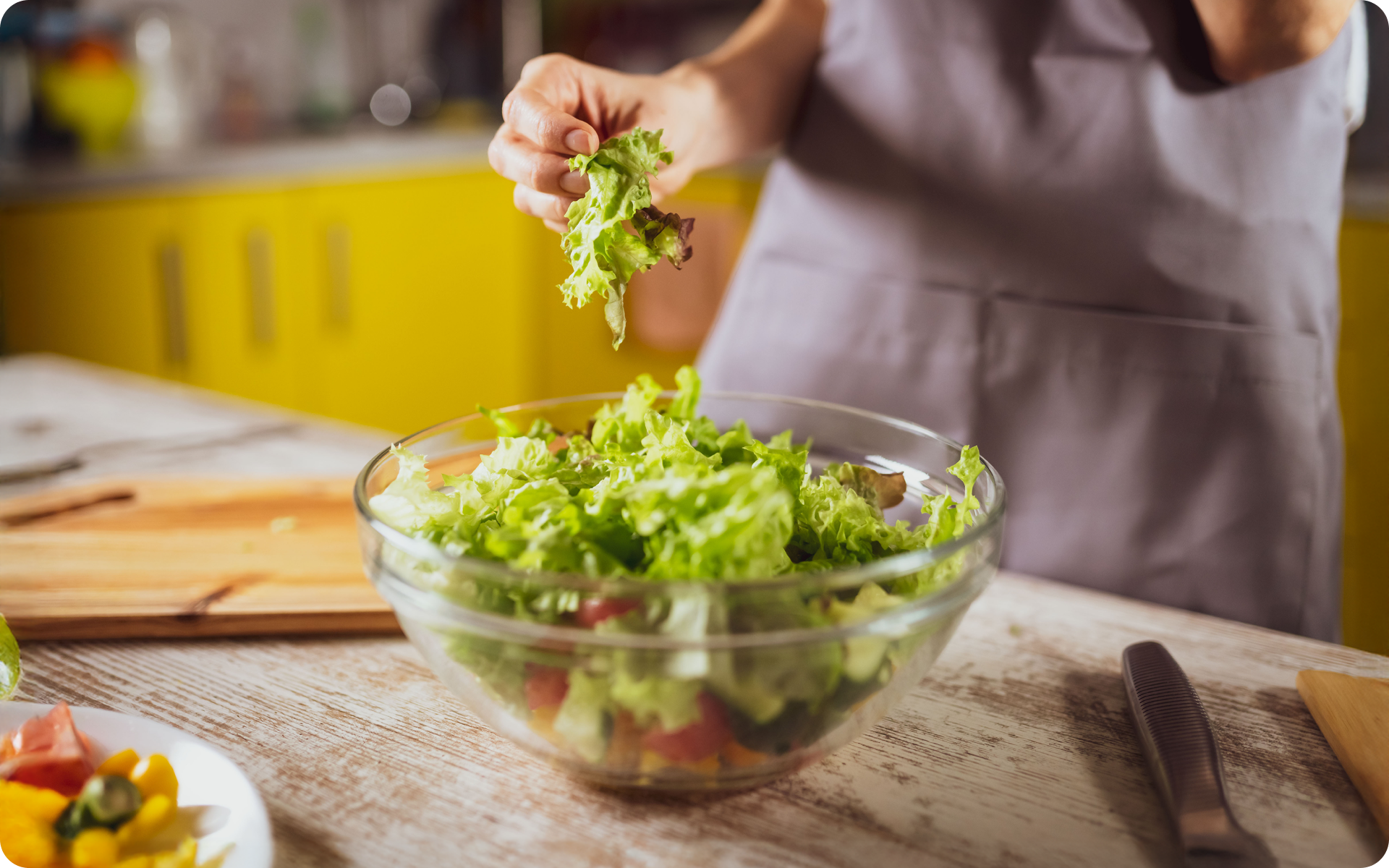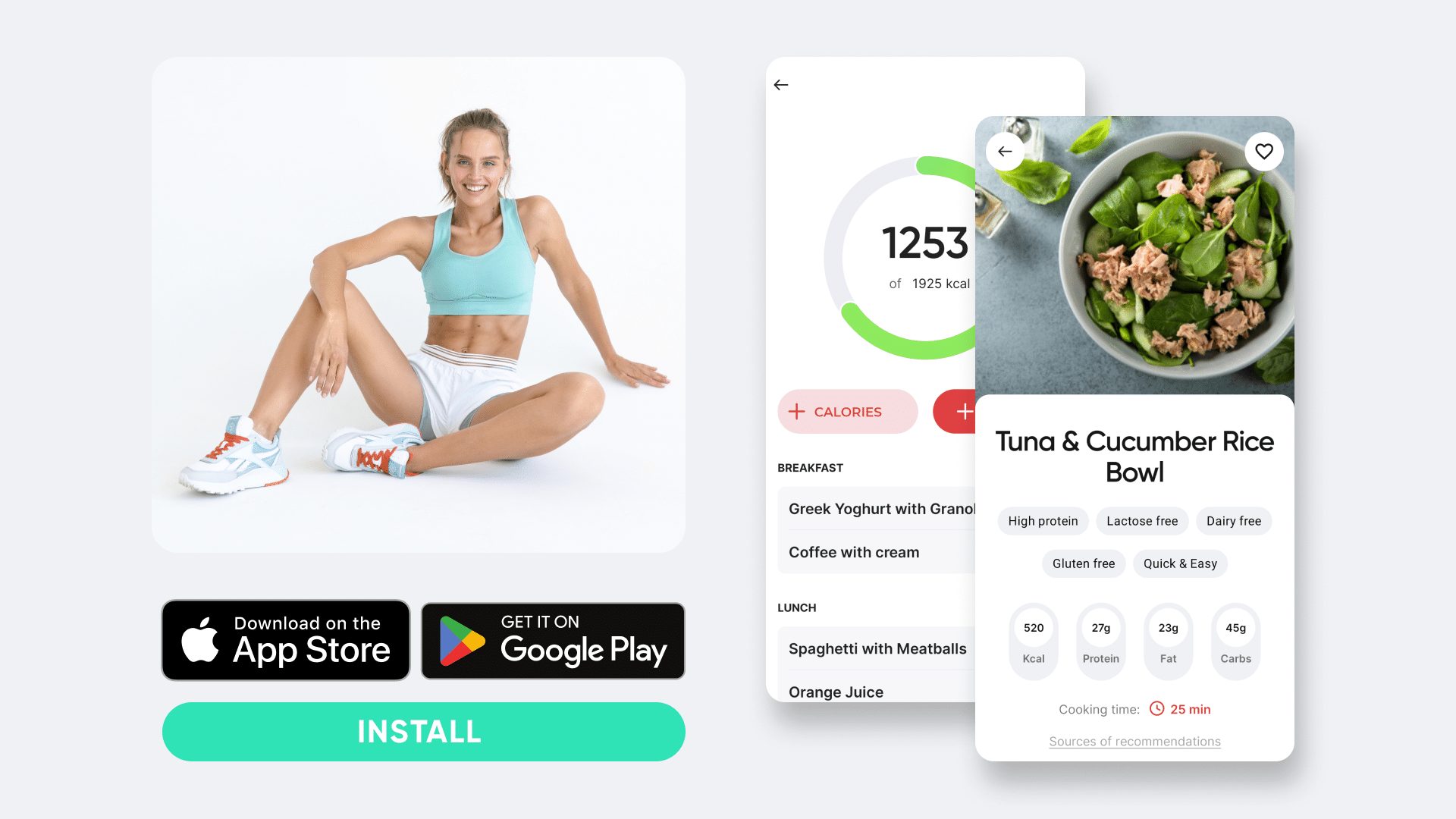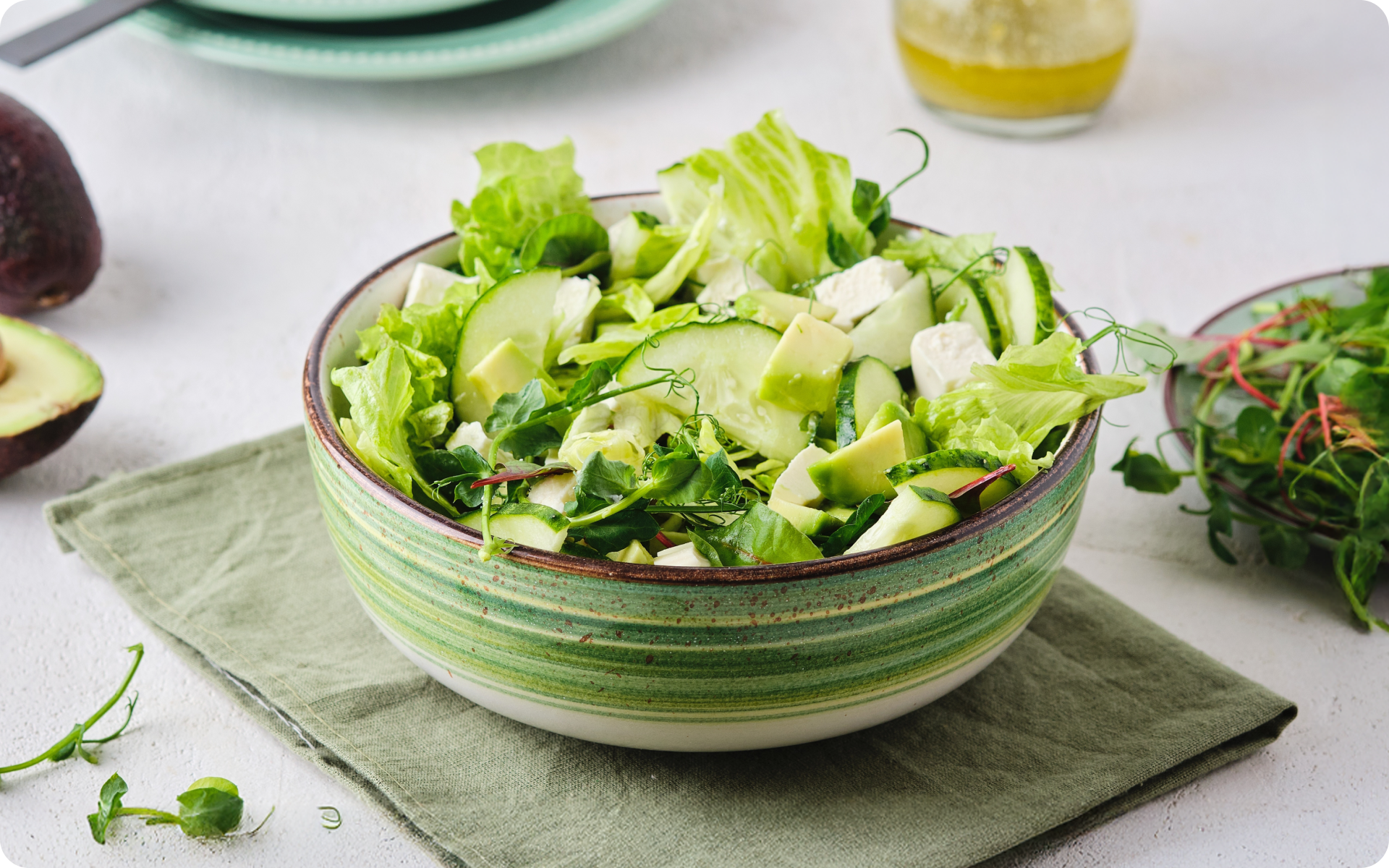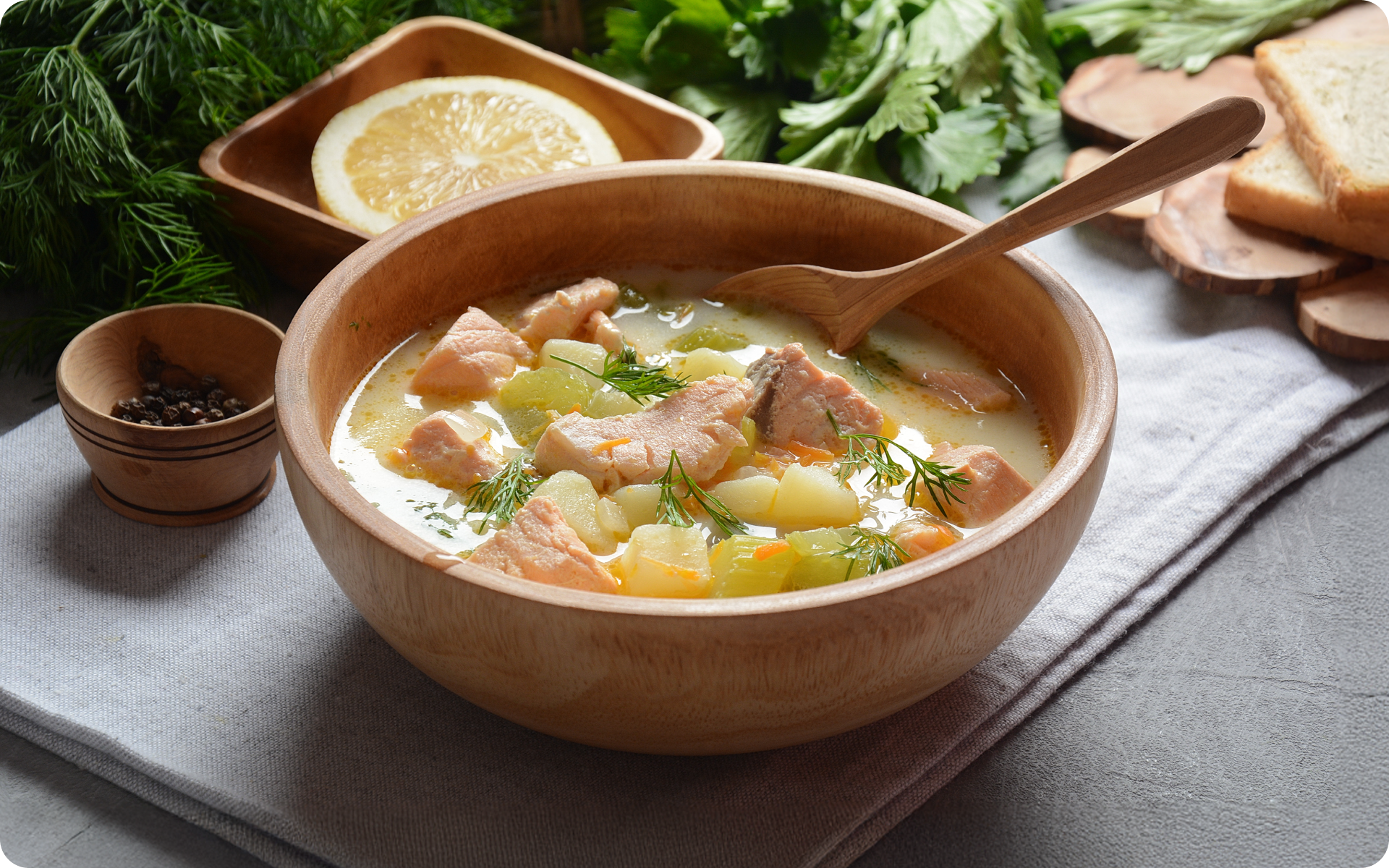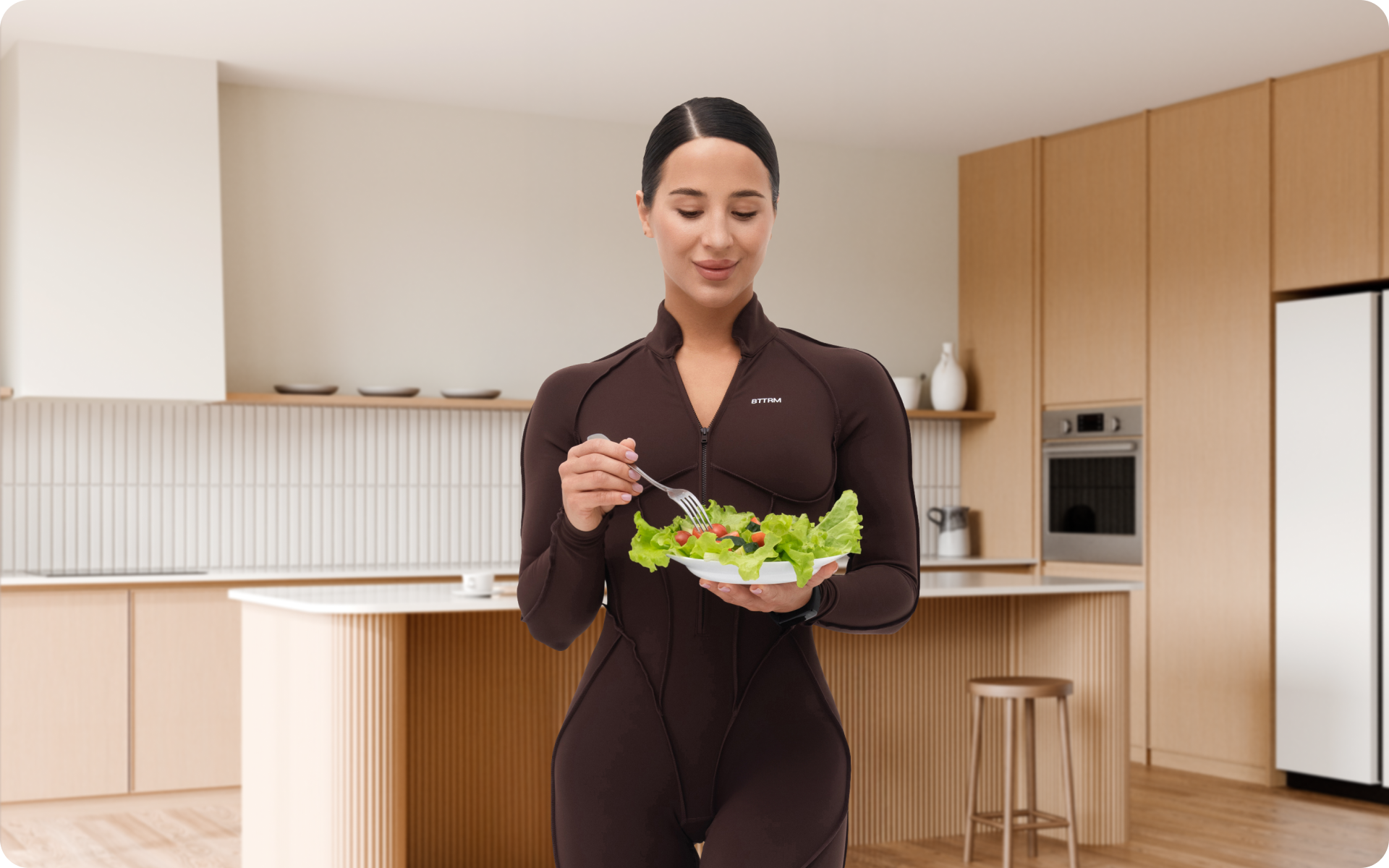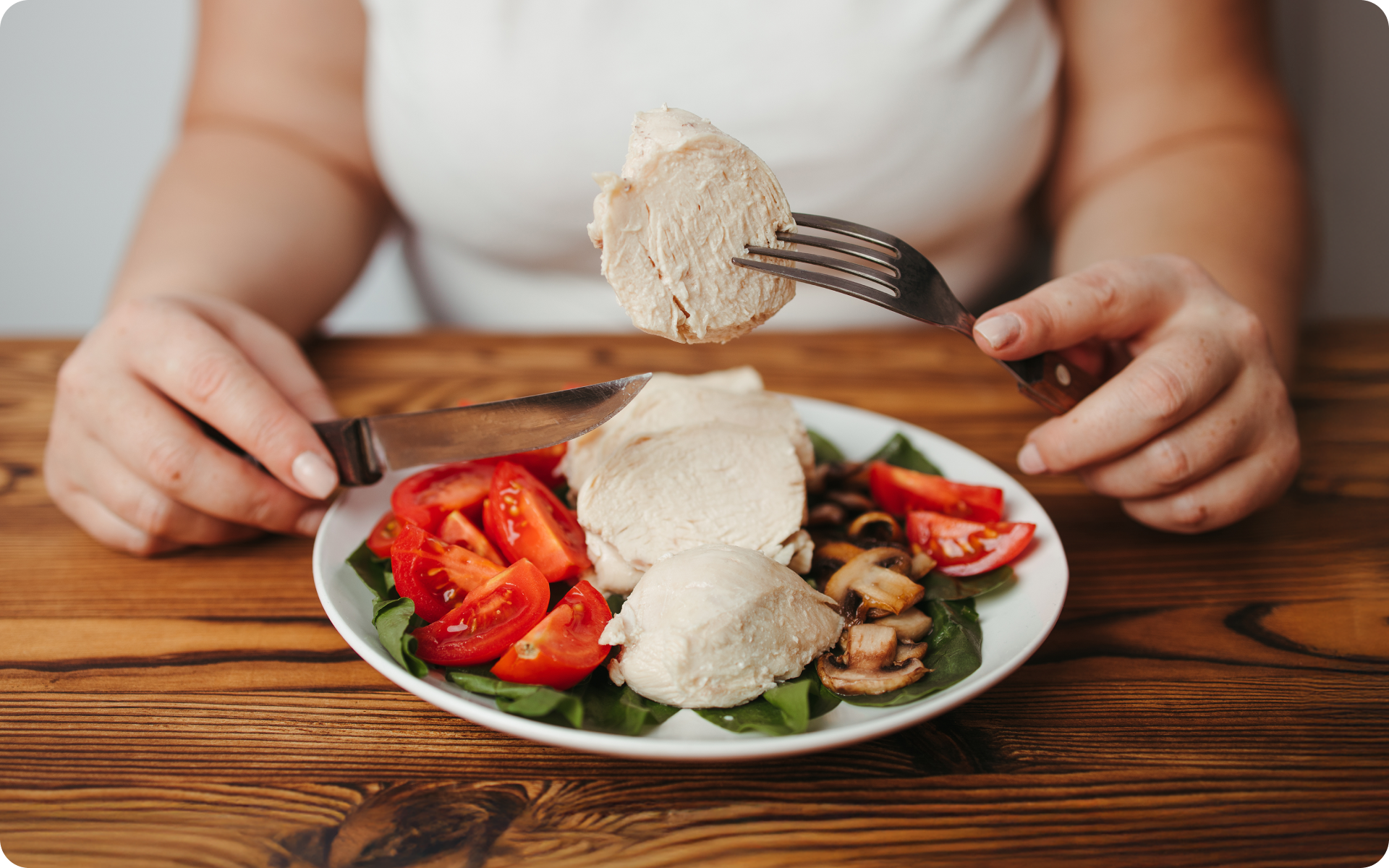One of the main staples of good health and a successful weight loss plan is a well-balanced diet. Such a diet includes a variety of essential nutrients in adequate proportions. Although meat is often an important part of a diet, there are many people who avoid it.
Most of the time, such people follow either vegetarian or vegan diets. These diets can require more effort, and without some planning, may cause serious health problems in the long term. However, in some cases, it can be very rewarding, and there is evidence that adopting such a lifestyle leads to weight loss and reduced risk of chronic disease (17).
But you don’t necessarily have to go vegetarian or vegan and stop eating meat forever if you want to shed a few pounds. For such cases, there is a special no-meat diet for 30 days that may be a great option and you can use this experience as an initiation phase for easier integration in the future. You can even utilize this strategy when you want to experience the benefits of cutting out meat for some time.
Read on to find out more about the health benefits of meat, a no-meat diet for 30 days results, and a no-meat diet plan for 30 days.
What Is A No Meat Diet For 30 Days?
A no-meat diet for 30 days is a month-long nutrition plan that excludes the consumption of meat. Unlike previously mentioned vegetarian and vegan diets, a no-meat diet for 30 days allows you to eat fish and animal-source products, such as eggs, dairy products, honey, and others if you choose, making it more achievable and balanced.
You need to make sure that you consume an adequate amount of protein throughout the whole course of this diet, as meat is one of the main sources of this macronutrient in your regular diet.
If weight loss is your goal, your no-meat diet plan for 30 days should include calorie restriction. Your calorie goal will be dependent on your initial energy requirements. The process of knowing how much restriction is needed is mentioned below:
- You can calculate how many calories you require daily with this calories burned calculator.
- Next, subtract approximately 500 calories from this number to get the number of calories you can consume in order to lose weight healthily.
- This weight loss pace will allow you to shed 1-2 pounds (0
Want to build an attention-grabbing bubble butt, blast away fat that’s stored in all the wrong places, spring-clean your diet, turn back the clock on your skin, skyrocket your self-confidence and shatter your insecurities? Check out the BetterMe app and set this plan in motion!
What To Avoid On No Meat Diet For 30 Days?
The answer to this question is pretty obvious. You should exclude all types of meat and meat products from your menu, including the following (13):
Red meat
This type of meat is of mammal origin and contains more iron-rich protein myoglobin than white meat. You can include red meat on your menu after you’re finished with the no-meat diet, but the UK NHS recommends you cut its consumption to 70g (around 2.5 oz) a day for general health (12). Examples of red meat include beef, pork, lamb, veal, goat, and game, such as bison, elk, and venison.
White meat
White meat is considered heart-healthier than red meat and often appears as a part of a weight loss diet. It is lighter in color than red meat and comes from small game and birds, such as chicken, turkey, duck, goose, and wild birds.
Processed meat
Processed meat is the least healthy meat, as it goes through preparation processes including salting, curing, smoking, drying, or other methods to enhance its flavor and increase its shelf life. It also tends to be high in saturated fat and sodium. Examples include bacon, hot dogs, sausage, jerky, salami, pastrami, and bologna.
What To Eat On No Meat Diet For 30 Days?
This nutritional plan is significantly less restrictive than becoming a vegetarian or vegan, so it’s easier to make sure you get all the essential nutrients when following a no-meat diet for 30 days.
As this dietary plan is somewhat similar to vegan or vegetarian plans, you can stick to their plans, in addition to consuming some of the foods that are forbidden by them. Here are the main nutrients that are present in meat, and alternative food sources where they can be found (18):
Protein
As meat is often the main protein provider in your diet, you’ll need to find other rich sources of it. You can consume protein with dairy products, eggs, and fish and seafood, or consume plant-based protein. Rich plant sources of protein include soy products (tofu, tempeh, edamame), lentils, chickpeas, peanuts, almonds, spirulina, quinoa, chia, hemp seeds, and beans with rice, potatoes, and others (16). Make sure you include a variety of plant-based proteins to get all the essential amino acids.
Iron
Iron is also incredibly important for the proper functioning of your body and often appears in your menu in the form of red meat. Luckily, there also are other sources of iron that you can and should include in your diet. These foods include beans and other legumes, dark leafy greens, seeds and nuts, and whole grains (9).
Calcium
You already know that calcium plays one of the main roles in your bone health, which is why you should consume a proper amount of it every day. One of the best sources of calcium is milk and dairy products. You can also find calcium in foods such as sardines and salmon, fortified dairy alternatives, tofu, green leafy vegetables, fortified breakfast cereals and fruit juices, nuts and seeds, legumes, and grains. (3).
Zinc
Another mineral that is essential for your body and comes mainly from animal products is zinc. You can get your daily dose of zinc from seafood, eggs, dairy, soy products, beans, and nuts.
Vitamin B12
Vitamin B12 plays an important role in red blood cell production. In addition to being found in meat, it is present in eggs and milk, certain fortified cereals, fortified plant-based milk, and nutritional yeast.
Health Benefits Of Meat
To figure out whether you should follow a no-meat diet for 30 days and start cutting out red meat or avoid all types of meat, you should first answer the question “Is meat good for you?”. Of course, meat consumption has its health benefits, so let’s look at the nutritional value of meat and what it has to offer you.
A 100g (3.5oz) serving of lean beef contains the following nutrients (2):
Calories: 205
Protein: 26.66g
Fats: 10.06g, of which saturated – 3.85g, monounsaturated – 5.22g, polyunsaturated – 0.36g
Carbs: 0g
It also contains micronutrients such as iron, zinc, phosphorus, niacin, riboflavin, vitamins B6, B12, and others.
The same portion of grilled chicken filet offers you the following (4):
Calories: 145
Protein: 22.24g
Fats: 5.2g, of which saturated – 0.84g, monounsaturated – 2.64g, polyunsaturated – 1.27g
Carbs: 2.37g
As you can see, chicken is lower in calories and fat, so it is therefore often recommended for a weight loss diet. Both meats are a great source of protein and contain other vital nutrients.
Read more: How to Make the Perfect Keto Taco With Multiple Stuffings, Shells, and Meats Variations
What are the main benefits of consuming meat?
Here are the main benefits that meat can provide you with (13):
-
Increased metabolism and reduced hunger
Meat is packed with protein and high-protein diets that include meat may increase your metabolic rate, suppress your appetite, and prolong the feeling of satiety. However, plant-based protein can do the same.
-
Improved bone health
Animal protein may add to your bone health by improving bone density and strength. Another component that is found in meat and also promotes better bone health is phosphorus, while dairy products are rich in calcium. There are also plant-based sources of these nutrients.
-
Preserved muscle mass
Animal protein is a great option for those who are trying to burn fat while preserving their muscle mass. In addition, protein can help maintain your muscles while promoting their growth when combined with strength training (15). Plant-based protein is also a great option.
-
Improved iron absorption
Meat contains heme iron that your body absorbs better than non-heme iron, which comes from plants. Eating something that is rich in vitamin C along with your plant-based iron source can help improve its absorption, but it won’t be absorbed as well as heme-iron.
The consumption of meat allows you to experience the above benefits, but there are some things you can do to maximize all the benefits of meat and reduce its negative effects. Here are some recommendations on how to do this:
- Avoid overcooking
- Remove all visible fat before cooking/eating
- Eat non-processed meats
- Choose grass-fed beef for a potentially healthier fat profile
What Are The Benefits Of Not Eating Meat?
Now you know the benefits of meat consumption, it’s time to look at the other side of and check out the benefits of not eating meat. So, what happens to your body when you give up meat?
This knowledge will help you determine what is more important to you and whether you should avoid eating meat for a month, or side with meat lovers and enjoy a juicy steak this evening. Here are the main benefits of not eating meat:
-
Weight loss
Compared to its plant-based alternatives, meat is quite high in calories and fat (14). Decreasing meat consumption will reduce your daily energy intake, thereby promoting weight loss.
-
Reduced inflammation
Inflammation affects every aspect of your health and can cause various diseases. If you avoid eating meat for a month, you may notice a decrease in your overall inflammatory markers. This is due to the anti-inflammatory properties of plant-based foods you consume instead of meat (6). They’re rich in fiber and antioxidants and low in saturated fats.
-
Reduced levels of cholesterol
Following a no-meat diet for 30 days may positively affect your cholesterol levels. High levels of blood cholesterol increase the risk of cardiovascular diseases and increased consumption of meat, which contains a considerable amount of saturated fats, may increase the cholesterol level in your blood. Sticking to a plant-based diet may lower your cholesterol levels, thereby reducing the chance of heart disease (8).
-
Improved gut health
Your microbiome consists of trillions of microorganisms and bacteria, many of which play a prominent role in the digestion process. Meat products may promote pathogenic bacteria growth. However, following a plant-based diet tends to promote healthy bacteria, which improves the microbiome’s health.
-
Lower risk of serious diseases
Your diet can be your enemy or savior when it comes to the risk of various diseases. Diets that are high in red and processed meats may increase the risk of type 2 diabetes (7) due to their ability to worsen inflammation, cause weight gain, and impair the way the insulin functions. Therefore, avoiding meat may decrease the risk of developing certain diseases.
Another benefit of not eating meat is the reduced risk of certain types of cancer. Plant-based diets are rich in antioxidants, which may have protective effects, while high red and processed meat intake is associated with an increased risk of certain cancers.
How can you successfully opt for a plant-based diet?
Transitioning into a no-meat diet requires effort, planning, and commitment. To make it easier, we’ve compiled a list of a few hacks:
-
Commit Wholeheartedly
Utmost commitment is essential for embracing such a drastic lifestyle change. It is important to clearly define your motivations and set realistic goals.
-
Plan Ahead
Planning meals in advance will ensure you’re prepared, as well as assuring a well-balanced and satisfying plant-based menu. Make sure to create weekly meal plans, explore new recipes, and stock up on plant-based staples.
-
Make Mindful Decisions
Mindfulness in food choices fosters a deeper connection with your plant-based journey. Don’t torture yourself! It’s not fun to scroll through Instagram and see a juicy steak or burger when you’re only a week into your diet.
-
Awareness is key
Be aware of your nutritional needs, explore diverse plant foods such as vegetarian snacks with protein, plant-based smoothies, etc, and choose nutritious options.
-
Ease into It Slowly
To prevent failure, it’s best to ease into the no-meat plan. Gradual adoption helps the body and mind adjust comfortably. As a tip, start with one or two plant-based meals a day and progressively increase.
-
Talk About It
Talk, complain, and share with your close ones— it’s always best to speak about your journey. Sharing your experience will foster support and accountability. Discuss your plant-based goals with friends and family or join online communities to get valuable insights and encouragement. (11)
When it comes to weight loss, progress is made by inches, not miles, so it’s much harder to track and a lot easier to give up. BetterMe app is your personal trainer, nutritionist and support system all in one. Start using our app to stay on track and hold yourself accountable!
A 7-Day Vegetarian Diet Meal Plan
Here is a sample of a no-meat diet plan that you can follow for 7 days: (1)
Day 1
- Breakfast (318 calories):
1 serving strawberry-banana green smoothie
- A.M. Snack (103 calories):
2 tbsp. unsalted almonds
- Lunch (343 calories):
1 serving Greek Salad with edamame
- P.M. Snack (30 calories):
1 plum
- Dinner (343 calories):
1 serving roasted vegetable and black bean tacos
- Evening Snack (78 calories):
3/4 cup frosted grapes
Daily Totals: 1,216 calories, 50 g protein, 143 g carbohydrate, 33 g fiber, 57 g fat, 967 mg sodium.
Day 2
- Breakfast (230 calories):
1 serving egg salad and avocado toast
- A.M. Snack (32 calories):
1/2 cup raspberries
- Lunch (343 calories):
1 serving Greek Salad with edamame
- P.M. Snack (78 calories):
1 large hard-boiled egg seasoned with a pinch each salt and pepper
- Dinner (496 calories):
2 servings kale salad with beets and wild rice
1 slice whole-wheat toast topped with 1/4 avocado, mashed, and seasoned with a pinch each salt and pepper
Daily Totals: 1,180 calories, 53 g protein, 98 g carbohydrate, 31 g fiber, 70 g fat, 1,986 mg sodium.
Day 3
- Breakfast (268 calories):
1 cup plain nonfat Greek yogurt
1/4 cup raspberries
2 tbsp. unsalted almonds
- A.M. Snack (101 calories):
1 cup sliced cucumber with 1 tbsp. sherry-shallot vinaigrette
- Lunch (345 calories):
2 servings leftover kale salad with beets and wild rice
- P.M. Snack (32 calories):
1/2 cup raspberries
- Dinner (453 calories):
1 serving roasted root vegetables and greens over spiced lentils
Daily Totals: 1,199 calories, 60 g protein, 113 g carbohydrates, 30 g fiber, 61 g fat, 1,187 mg sodium.
Day 4
- Breakfast (318 calories):
1 serving strawberry-banana green smoothie
- A.M. Snack (78 calories):
1 large hard-boiled egg seasoned with a pinch each of salt and pepper
- Lunch (374 calories):
1 serving green salad with pita bread and hummus
- P.M. Snack (30 calories):
1 plum
- Dinner (400 calories):
1 serving spaghetti squash with roasted tomatoes, beans, and almond pesto
Daily Totals: 1,200 calories, 52 g protein, 146 g carbohydrate, 30 g fiber, 53 g fat, 1,592 mg sodium.
Day 5
- Breakfast (252 calories):
1 cup plain nonfat Greek yogurt
1/4 cup raspberries
2 tbsp. unsalted almonds
- A.M. Snack (30 calories):
1 plum
- Lunch (320 calories):
1 serving slow-cooker creamy lentil soup
- P.M. Snack (115 calories):
3/4 cup sliced carrots
3 tbsp. hummus
- Dinner (419 calories):
2 3/4 cup tofu and vegetable scramble
- Evening Snack (78 calories):
3/4 cup frosted grapes
Daily Totals: 1,215 calories, 80 g protein, 131 g carbohydrate, 32 g fiber, 47 g fat, 1,530 mg sodium.
Day 6
- Breakfast (230 calories):
1 serving egg salad avocado toast
- A.M. Snack (103 calories):
2 tbsp. almonds
- Lunch (374 calories):
1 serving green salad with pita bread and hummus
- P.M. Snack (78 calories):
1 hard-boiled egg seasoned with a pinch each salt and pepper
- Dinner (430 calories):
1 serving squash and red lentil curry
2 cups mixed greens tossed with 1 tbsp. sherry-shallot vinaigrette
Daily Totals: 1,214 calories, 50 g protein, 124 g carbohydrates, 33 g fiber, 64 g fat, 2,281 mg sodium.
Day 7
- Breakfast (318 calories):
1 serving strawberry-banana green smoothie
- A.M. Snack (61 calories):
2 plums
- Lunch (320 calories):
1 serving leftover slow-cooker creamy lentil soup
- P.M. Snack (135 calories):
1/2 cup raspberries
2 Tbsp. almonds
- Dinner (361 calories):
1 serving raw vegan zoodles with romesco
3/4 cup canned cannellini beans, rinsed
2 cups mixed greens tossed with 1 tbsp. sherry-shallot vinaigrette
Daily Totals: 1,195 calories, 60 g protein, 157 g carbohydrate, 42 g fiber, 46 g fat, 1,482 mg sodium.
Read more: Your Guide to Cauliflower Steak: The Perfect Meatless Dish for Meat Lovers
FAQs
How long does it take to digest meat?
In a normal omnivorous diet, meat is digested in around 12 or 48 hours, just like everything else (10).
Will I lose weight if I stop eating meat?
There is a high possibility that you will lose weight if you stop eating meat while following a healthy diet and leading an active lifestyle (19).
What happens if you don’t eat meat for 30 days?
Not eating meat for 30 days can have both positive and negative outcomes. The are likely to the following forms:
- Nutrient Shifts: Reduced meat intake for 30 days may alter nutrient balance, impacting protein, iron, zinc, and B vitamins.
- Weight and Body Composition: Changes may occur in weight and body composition as individuals shift away from meat-based proteins.
- Digestive Adjustments: Adapting to a plant-based diet might lead to digestive changes due to increased fiber intake.
- Energy Levels: Energy fluctuations, both positive and negative, may be experienced during the transition.
- Gut Microbiota: Dietary shifts can impact gut microbiota, influencing overall gut health.
- Taste Preferences: Palate preferences may evolve, introducing individuals to new plant-based flavors.
- Health Benefits: Some may notice positive changes in cholesterol, blood pressure, and overall well-being.
Environmental and Ethical Awareness: A meat-free month may heighten awareness of environmental and ethical considerations linked to meat consumption.
Can you lose weight by not eating meat for a month?
Yes, you can most certainly lose weight by not eating meat for a month. This occurs due to a reduced caloric intake, fewer saturated fats, higher fiber intake, and increased focus on whole, nutrient-dense foods — all of which are conducive to weight loss.
What can I replace meat with?
You can replace meat with a variety of plant-based options such as tofu, tempeh, legumes, beans, lentils, mushrooms, and plant-based protein sources like seitan and edamame. These alternatives offer protein, essential nutrients, and diverse flavors for a well-balanced diet.
The Bottom Line
It is solely your choice whether to consume meat or not. If you want to experience the benefits of not eating meat or are considering becoming a vegetarian and want to try if that is your thing, you can try following a no meat diet for 30 days. If you feel like meat plays a very important role in your diet, and you would like to keep eating meat, know that there is nothing wrong with that, but a balanced diet with a broad variety of food is always better. However, remember, that before making any modifications in your nutritional plan you should consult a dietitian.
DISCLAIMER:
This article is intended for general informational purposes only and does not serve to address individual circumstances. It is not a substitute for professional advice or help and should not be relied on for making any kind of decision-making. Any action taken as a direct or indirect result of the information in this article is entirely at your own risk and is your sole responsibility.
BetterMe, its content staff, and its medical advisors accept no responsibility for inaccuracies, errors, misstatements, inconsistencies, or omissions and specifically disclaim any liability, loss or risk, personal, professional or otherwise, which may be incurred as a consequence, directly or indirectly, of the use and/or application of any content.
You should always seek the advice of your physician or other qualified health provider with any questions you may have regarding a medical condition or your specific situation. Never disregard professional medical advice or delay seeking it because of BetterMe content. If you suspect or think you may have a medical emergency, call your doctor.
SOURCES:
- 7-Day Clean-Eating Vegetarian Meal Plan for Weight Loss (2023, eatingwell.com)
- Beef, plate, inside skirt steak, separable lean only, trimmed to 0″ fat, all grades, cooked, broiled (2019, fdc.nal.usda.gov)
- Benefits and sources of calcium (2020, medicalnewstoday.com)
- Chicken fillet, grilled (2020, fdc.nal.usda.gov)
- Counting calories: Get back to weight-loss basics (2020, mayoclinic.org)
- Dietary pattern analysis and biomarkers of low-grade inflammation: a systematic literature review (2013, pubmed.ncbi.nlm.nih.gov)
- Dietary protein intake and incidence of type 2 diabetes in Europe: the EPIC-InterAct Case-Cohort Study (2014, pubmed.ncbi.nlm.nih.gov)
- Effects of plant-based diets on plasma lipids (2009, pubmed.ncbi.nlm.nih.gov)
- Everything you need to know about iron (2018, medicalnewstoday.com)
- How long does meat sit in your gut? (n.d., sciencefocus.com)
- I Tried the Plant-Based Whole30 Program and Here’s What Happened (2023, vegnews.com)
- Meat in your diet (2018, nhs.uk)
- Meat: Good or Bad? (2019, healthline.com)
- Meatless meals: The benefits of eating less meat (2020, mayoclinic.org)
- Relationship between animal protein intake and muscle mass index in healthy women (2009, pubmed.ncbi.nlm.nih.gov)
- Top 15 sources of plant-based protein (2018, medicalnewstoday.com)
- Vegetarian Diets and Weight Reduction: a Meta-Analysis of Randomized Controlled Trials (2016, ncbi.nlm.nih.gov)
- What to know about becoming a vegetarian (2019, medicalnewstoday.com)
- (17) Will You Lose Weight By Giving Up Meat? (2016, psychologytoday.com)
